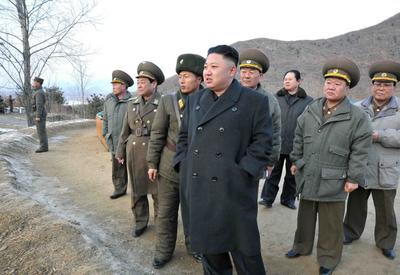Whereas Seoul, Washington and Tokyo are extremely worried and want to impose harsher sanctions on the recalcitrant regime, Beijing and Moscow are obviously not ready to act tough on Pyongyang, even while showing some concern.
Russian Foreign Ministry officials have made bland statements on the matter, and the public’s reaction has been muted as well. Overall, Russia’s reaction to the test in February was certainly more subdued than its reaction to North Korea’s first nuclear detonation in 2006, when there was even a mass rally of protest in Russia’s main Far Eastern city of Vladivostok. Russia’s soft stance appears difficult to comprehend. Many South Korean, Japanese and US supporters of a tougher line on Pyongyang believe that Russia has ample reason to be far more proactive on the North Korean nuclear problem than it is now.
First, they point out, Moscow should fear the emergence of a nuclear power right next door to its Far Eastern borders, all the more so because the North Korean regime has a reputation for erratic and unpredictable behaviour. Second, nuclear and missile tests conducted by North Korea close to the Russian Far East may put this territory at risk. Third, North Korea’s nuclear and missile programs push the United States and its Asian allies to build up missile defences, something that Moscow has always been wary of. Fourth, North Korea may try to sell its WMD technologies, undermining the global non-proliferation regime in which Russia is a major stakeholder.
Yet, to Russia itself, none of the above arguments seems convincing enough. First, no one in the Russian policy-making community actually believes that North Korea will ever attack Russia, let alone use nuclear weapons against it. Unlike Washington and Seoul, Russia has never called for regime change in Pyongyang and has always maintained a stable relationship with the DPRK. Second, while nuclear and missile tests have been carried out near Russian borders, they are not viewed as posing a substantial risk. Radiation has never exceeded normal levels in the Russian Far East in the wake of North Korean underground explosions. The fall of a North Korean missile on Russian territory as a result of a failed launch is theoretically possible, but, given the low population density in the Russian Far East, it would have to land somewhere in the centre of Vladivostok to cause major damage.
Third, even if North Korea abandoned its missiles, the United States would be unlikely to roll back its missile defence plans. In any case, Russia is fretting more about the US-led missile defence system in Europe, which North Korea has nothing to do with, rather than the defence system in East Asia. Fourth, unlike the United States and its allies, Russia is not accusing the DPRK of nuclear and missile trafficking. Perhaps Moscow finds no reliable evidence of such trafficking. Or else it might calculate that Pyongyang’s potential clients pose no threat to Russia.
There is another reason why Russia is not particularly afraid of North Korea. During a recent televised event, Russian Federal Security Service chief Alexander Bortnikov, in the presence of President Vladimir Putin, pointed to rising ‘geopolitical pressure on Russia on behalf of the United States and its allies’, thus making it very clear where Russia believes the main threat is coming from. Pyongyang’s nuclear and missile mischief has become less important to Moscow at a time when Russia is consumed by its confrontation with Washington.
Hence, Russia feels no pressing need to take emergency measures against North Korea. Moreover, Russia does not have a great deal of leverage over Pyongyang, apart from its Security Council membership. Russian trade with the DPRK is insignificant, meaning a trade embargo would have little effect. A ban on the import of North Korean labour would be a more effective step, given the guest workers from North Korea toiling in the Russian Far East are one of the regime’s foreign currency sources. However, even if Moscow used its position to full capacity, Pyongyang would hardly change its ways. North Korea’s most important political and economic partner is China. Only China could force the DPRK to stop nuclear and missile tests.
All of the above is not to say that Russia is happy watching North Korea move toward full-fledged nuclear and missile capabilities. Moscow is aware that if more countries possess nuclear and missile arms, its strategic deterrent will become less valuable. That is why, in the long run, the North Korean problem poses a real threat to Russian national interests. However, Moscow is unlikely to tackle this risk in a determined way until its more pressing foreign policy problems, especially its relations with the United States, are resolved.
Artyom Lukin is Associate Professor of International Relations and Deputy Director for Research at the School of Regional and International Studies, Far Eastern Federal University, Vladivostok.

